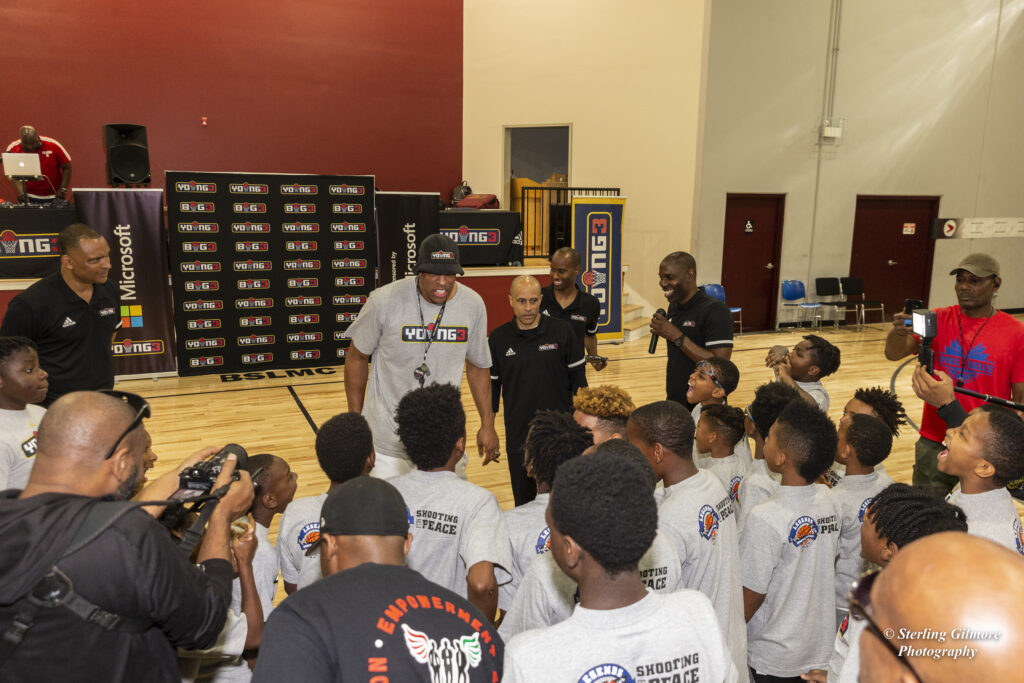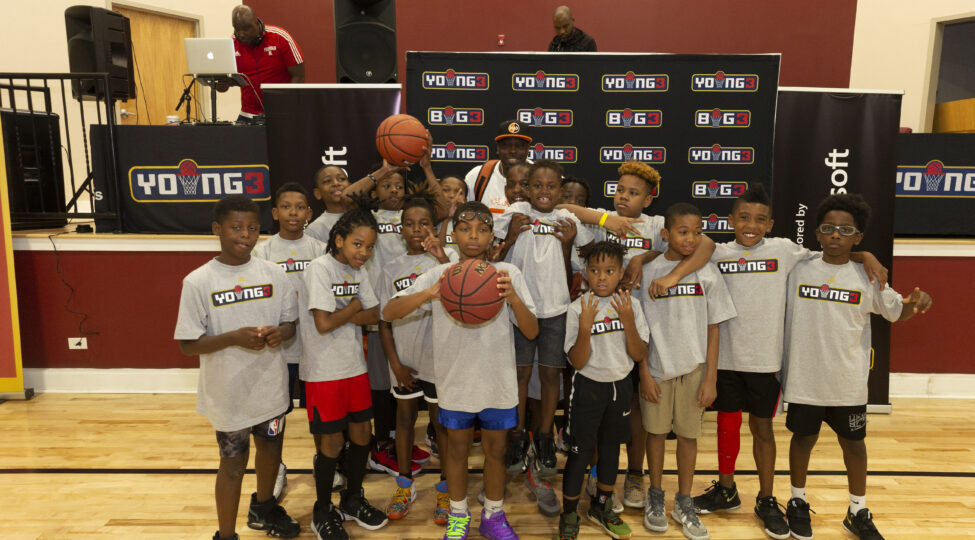Earlier, I was able to speak to Young3 President Jerome “Junkyard Dog” Williams and his brother Johnnie. On Friday the 24th, I was able to witness the YOUNG3 in action during an event they held in Chicago. Here are some notes from the event, which was by Microsoft and in with Books over Balls as well as Shooting for Peace:
The first thing I noticed when I stepped into the gym at 5222 South Halsted was the noise level. A lot of it came from the full DJ and speaker setup provided by Microsoft, with the rest coming from the campers, who ranged in age from 9 to 15.
Basketball and XBOX. Could there be a better combination? Today’s YOUNG3 clinic was a major success. Thank you to @microsoft for helping to make it happen. pic.twitter.com/N9SmZvBBQ3
— BIG3 (@thebig3) June 25, 2022
One side of the court was occupied by the younger campers, who went through basic drills. There were layup lines, there was a rope ladder drill – the basics.
On the other side of the court, the older campers were shown some advanced moves, and I do mean advanced. They were taught to chain crossovers into double-crosses, between-the-leg dribbles, behind-the-back moves, and spins, all while changing levels and speeds.
After that, the attendees sat down to hear from some of their coaches. First was Charles “Choo” Smith, who despite standing no taller than 5’8 has played in the CBA, for the Harlem Globetrotters, and has been coaching ever since. He spoke about the importance of finding your passion in life, making the necessary sacrifices to follow your passion, and leaving a legacy behind.
I was able to get a quick interview with him after he gave his talk, which has been edited for the purposes of brevity and clarity:
Krolik: What drew you to the YOUNG3?
Smith: Well Jerome [“Junkyard Dog” Williams] and I have known each other for 20-plus years, we’re both from the Maryland area. We played against each other in a small gym where all the best players in the area played. Ironically, we both retired from playing the same year, 2005, and we both started working with youth.
Krolik: How do you balance telling kids to believe in themselves and to not let anything get in the way of their dreams while also communicating the importance of sometimes listening to older guys who it might seem like are getting in the way of what they want to do but have their best interests at heart?
Smith: When you listen to Arthur [Agee] speaking, his parents held him accountable. My parents held me accountable, I was in that jungle just like him. When you have parents that care about you and you listen to them and allow them to teach you how to make good decisions and choices, that’s vital.
You must give people grace. We’re going to make mistakes. We’re going to have challenges. And you must keep building people back up, because that’s life. If you put a fly on the wall and watched everyone in America, you’d be surprised at what you saw. And I just think sports gives you a pure space. Because you can’t hide. Everybody can see your attitude. Everyone can see how hard you work. Everyone can see if you can play or not. Can’t hide behind a cubicle or a business, you have to go out there and perform. Our minds, bodies, and souls must be nurtured by someone with good intent.
Krolik: This is kind of a follow-up. I noticed you said it doesn’t have to be basketball that you’re passionate about, it could be a lot of things. How do you balance pushing kids that love the game to keep going and pursuing that passion while being realistic with them about the odds of playing professional basketball for a living?
Smith: It’s a big world. And a lot of people are playing basketball. And only 5,000 people have ever played in the NBA. Only about 40 or 50,000 have ever played any kind of professional basketball. But you have to give a kid an opportunity to understand that you have to give it your best effort. Do all you can, follow all the different nuances. Even if you don’t make it, there’s other things that happen within sports. You can be a PR Director. You can be a marketing director. You can be an assistant coach. You can be a sportswriter.

All these things are connected to the game. It’s about how your character was in the game. And people will speak for you. They’ll say “I like him.” Even if he only averaged four points a game, or barely got in the game. He was a great practice player. And because of that I have this big job for him working for Microsoft, working for IBM, working for Amazon.
For me, God blessed me to have 26 acres of land in my city of Baltimore that I’m getting ready to put a Youth Empowerment Center on, give people housing and workforce development, all because I played this game. All because I love this game. All because I never cheated the game, and I’ve been helping people for a long time. And that’s what it’s about, man. It’s bigger than basketball. We’re only as good as the day God gives us. And we have to challenge ourselves to figure out how to make each day a masterpiece and to find the purpose that would allow us to do that.
Krolik: So what you’re saying is if you devote yourself fully to the game and give to the game, it will always lead to something good, even if it’s not playing the game professionally.
Smith: Exactly.
Krolik: And I’m sure you had plenty of people tell you because of your height you wouldn’t make it but you still gave it your all and never shorted the game, and you’ve accomplished all that you have because of it. There’s never an upside to putting 90% of yourself into something.
Smith: It’s like Agee says, your gift materializes in a great way when you nurture it. And a big shout-out goes to Cube for doing this. I pray he understands the value and the impact that he’s had.
After Smith was done speaking, Chicago legend Arthur Agee addressed those in attendance. For those who don’t know, Agee was one of the two “stars” of the seminal 1994 basketball documentary “Hoop Dreams,” which followed the high school basketball careers of Agee and William Gates through both the good and the bad. Filming took place over years, and Roger Ebert named it the best movie of the ‘90s.
Agee, who has overcome adversity at every turn in his life, only some of which can be seen over the 180-minute runtime of “Hoop Dreams,” was intense and passionate in a way that’s frankly hard to describe in text. He made it clear to the campers not to expect to have anything handed to them, but that any challenge, including “beating the hood” could be overcome through the combination of the right mindset, the right work ethic, and the right skill set. He also stated the importance of self-belief, as there will be times when you can’t count on anyone to believe in you other than yourself.
After his talk was over, I gave him a version of one of the questions I asked Smith – how do you balance telling kids to believe in themselves above supposed authority figures, like he had to do when the late Coach Gene “Ping” Pingatore kicked him off the high school team (and effectively out of the private high school he had been recruited to play for), while also communicating to them the importance of listening their elders during times like his own lecture? Agee responded that it’s important to develop the skills to figure out which figures in your life have your best interest at heart and the ones who don’t, because there is a fine line between self-belief and shutting out the right advice.
Agee wrapped up his talk with as good a mantra as any for an aspiring young player to follow – “Live the Hoop Dream, and control your destiny.”
Photos Courtesy of Nerdy Shoot Chicago:
Visit our Website: https://nerdyshoot.com
Instagram: @iamnerdyshoot | Twitter: @iamnerdyshoot |
Facebook: Camera Nerdy Shoot Chicago



